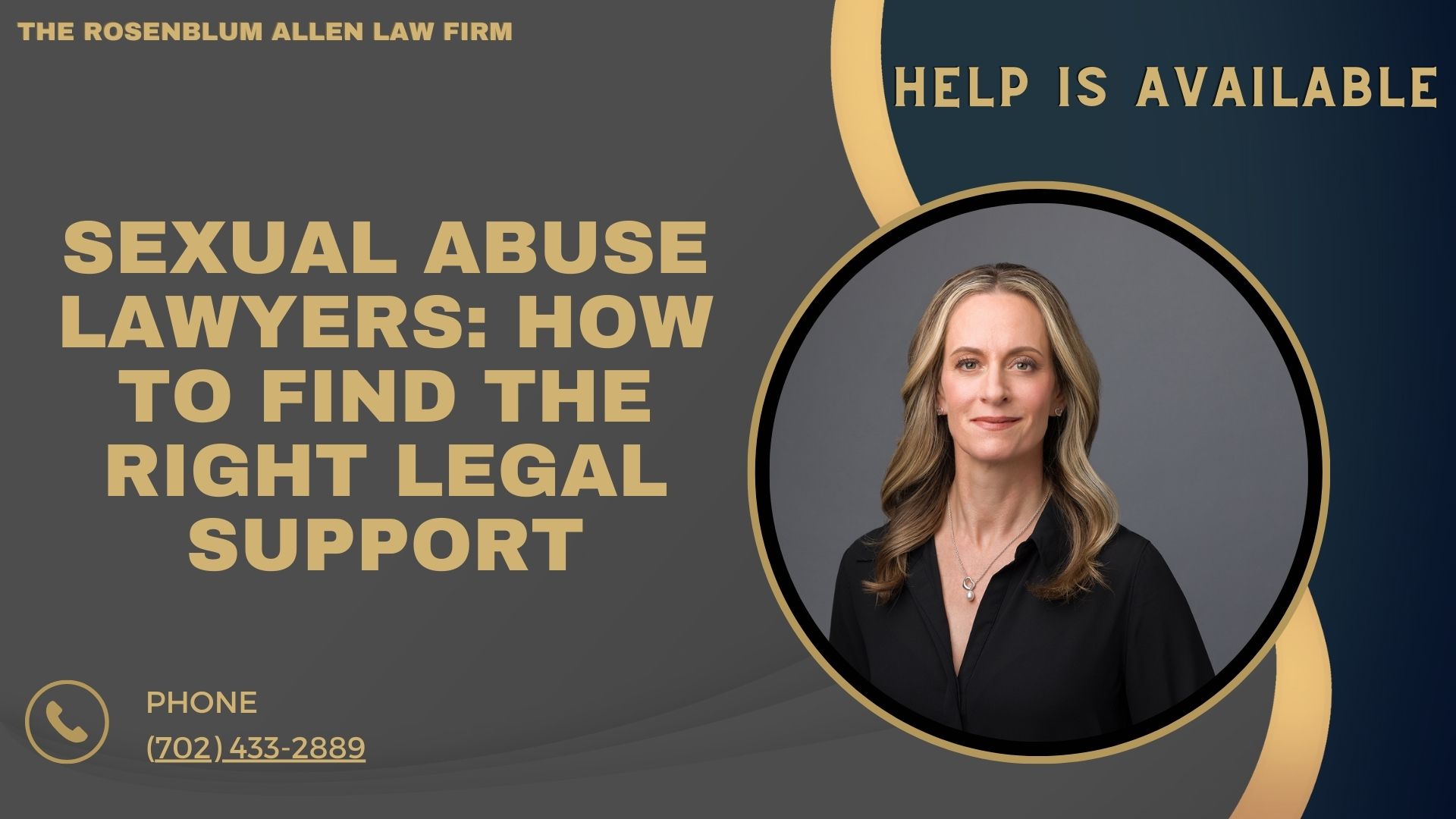Sexual abuse is a deeply traumatic experience that can have long-lasting effects on survivors. It encompasses a range of behaviors, including harassment, assault, and exploitation. Seeking legal help is crucial in the journey towards justice and healing.
A sexual abuse lawyer specializes in handling these sensitive cases, providing legal representation and support to survivors. This guide will help you understand the role of sexual abuse lawyers and how to find the right one for your needs.

Who Are Sexual Abuse Lawyers?
Role and Responsibilities
Sexual abuse lawyers are legal professionals who specialize in cases involving sexual misconduct. Their main job is to represent survivors in civil and criminal cases. They seek justice and compensation for the harm suffered. They guide through the legal process, from initial consultations to court proceedings.
Differences from Other Types of Lawyers
Other lawyers lack the special knowledge and experience of sexual abuse lawyers. They include general practitioners. They are skilled at handling sensitive and complex cases of sexual misconduct. They are trained to handle the emotional and psychological aspects of these cases. They do so with care and professionalism.
Importance of Specialization in Sexual Abuse Cases
Specialization matters. Sexual abuse cases need deep understanding of law and psychology. A specialized lawyer is better equipped to navigate the details of the law. They can provide the needed support to survivors throughout the process.
Why You Need a Sexual Abuse Lawyer
Legal Complexities of Sexual Abuse Cases
Sexual abuse cases are legally complex. They often involve multiple jurisdictions, various types of evidence, and intricate legal arguments. A sexual abuse lawyer has the expertise to manage these complexities and build a strong case.
Emotional and Psychological Support
Dealing with the aftermath of sexual abuse is emotionally taxing. A compassionate lawyer not only provides legal representation but also offers emotional support. They understand the trauma. They can connect survivors with more resources, like therapists and support groups.
Financial Compensation and Justice
Survivors of sexual abuse may be entitled to money. It’s for medical expenses, lost wages, and pain. A skilled lawyer will fight for fair pay. They will also work to bring justice to the survivor.

Qualities to Look for in a Sexual Abuse Lawyer
Compassion and Empathy
An excellent sexual abuse lawyer should be compassionate and empathetic. They need to understand the emotional trauma and provide a supportive environment.
Experience and Expertise in Sexual Abuse Cases
Experience matters. Look for a lawyer with a proven track record in handling sexual abuse cases. They should know the laws and have a history of successful outcomes.
Strong Communication Skills
Effective communication is critical. Your lawyer should explain the legal process well. They should keep you informed about your case’s progress. They should listen to your concerns and answer your questions promptly.
Proven Track Record of Success
Review the lawyer’s past cases and outcomes. A lawyer with a strong record of success is more likely to achieve favorable results for your case.

Steps to Find a Sexual Abuse Lawyer
Researching Potential Lawyers
Online Resources and Directories
Start by researching online. Legal directories and websites list lawyers for sexual abuse cases. Look for those who specialize in sexual abuse.
Referrals from Trusted Sources
Ask for referrals from trusted sources such as friends, family, or support organizations. Personal recommendations can lead you to reliable and compassionate lawyers.
Reading Reviews and Testimonials
Read reviews and testimonials from former clients. This can give you insight into the lawyer’s approach, effectiveness, and client-handling style.
Initial Consultations
What to Expect
During the first meeting, the lawyer will review the basics of your case. They will also discuss potential strategies. This meeting is an opportunity to evaluate whether the lawyer is a good fit for you.
Questions to Ask During the Consultation
Prepare a list of questions to ask during the consultation:
What is your experience with sexual abuse cases?
How do you approach these cases?
What are your fees and payment structure?
How will you keep me informed about my case?
Evaluating the Lawyer’s Responsiveness and Approach
Pay attention to how the lawyer interacts with you. Are they attentive and respectful? Are they interested in helping you? A responsive and caring lawyer is essential for navigating such a sensitive case.
Assessing Qualifications and Credentials
Verifying Licenses and Certifications
Ensure the lawyer is licensed in your state. Also, check for any certifications showing specialization in sexual abuse cases.
Understanding the Lawyer’s Educational Background
Review the lawyer’s education to ensure they have the needed training.
Checking for Disciplinary Actions
Look into any past disciplinary actions against the lawyer. This information can usually be found through state bar associations or legal directories.

What to Expect During the Legal Process
Initial Case Evaluation
Gathering Evidence and Documentation
The first step in your legal journey is an initial case evaluation. Your lawyer will gather evidence and documentation to support your case. This can include:
Medical records
Police reports
Witness statements
Any physical evidence
Your lawyer will also interview you to fully understand what happened. This information is crucial to building a solid case.
Understanding the Statute of Limitations
Every state has a statute of limitations and a time limit for filing a lawsuit. Your lawyer will help you understand these deadlines to ensure your case is filed on time. Missing these deadlines can mean losing your right to seek justice.
Filing a Lawsuit
Drafting and Submitting the Complaint
Once all necessary evidence is gathered, your lawyer will draft a formal complaint. This document outlines your allegations and the damages you are seeking. The complaint is then submitted to the court to start the legal process officially.
Serving the Defendant
After filing the complaint, you must serve the defendant. They are the person or entity you are suing. This means they are formally notified of the lawsuit. Your lawyer will handle this process. They will ensure it is done right and within the law.
Pre-trial Procedures
Discovery Process
During the discovery process, both sides exchange information and evidence. This stage is crucial for building your case. Discovery methods include:
Depositions (interviews under oath)
Interrogatories (written questions)
Requests for documents
Your lawyer will guide you. They will help you respond to the other side’s requests and gather more evidence for your case.
Depositions and Interrogatories
Depositions and interrogatories are critical components of discovery. In a deposition, the opposing lawyer may question you and other witnesses under oath. Interrogatories are written questions that you must answer truthfully. Both are used to gather information and prepare for trial.
Settlement Negotiations
Mediation and Arbitration
Before going to trial, many cases are resolved through mediation or arbitration. Mediation involves a neutral third party who helps both sides settle. Arbitration is more formal. It resembles a mini-trial, where an arbitrator makes a final decision. Both methods aim to resolve the case without a lengthy trial.
Evaluating Settlement Offers
Your lawyer will help you evaluate any settlement offers. They will consider factors like:
The strength of your case
Potential compensation
Your personal needs and desires
It’s important to understand that settlements can save time and stress, but they should also be fair.
Trial Process
Courtroom Procedures
If your case goes to trial, your lawyer will guide you through the courtroom procedures. This includes selecting a jury, presenting opening statements, and calling witnesses to testify. Your lawyer will advocate for you. They will present evidence and make legal arguments for your case.
Presenting Evidence and Testimonies
Evidence and testimonies will be presented during the trial to support your case. This includes:
Witness testimonies
Expert witness analysis
Physical evidence
Documentation
Your lawyer will cross-examine the defendant’s witnesses and challenge their evidence.
Jury Deliberation and Verdict
After both sides have presented their cases, the jury will deliberate. This means they will discuss the evidence and decide on a verdict. Your lawyer will explain the possible outcomes and what each means for you. If the verdict is in your favor, they will help you. They will help you understand the next steps for getting compensation.

Legal Rights of Sexual Abuse Survivors
Understanding Your Legal Rights
Right to Privacy and Confidentiality
As a survivor, you have the right to privacy. You also have the right to confidentiality in the legal process. Your lawyer will take measures to protect your identity and personal information.
Right to Pursue Civil and Criminal Charges
You have the right to pursue both civil and criminal charges. Civil cases seek money. Criminal cases aim to hold the perpetrator accountable under the law. Your lawyer can help you navigate both options.
Statute of Limitations
Time Limits for Filing a Lawsuit
Each state has specific time limits for filing sexual abuse lawsuits. These limits can vary widely. Your lawyer will explain the time limit in your state. This is to ensure your case is filed on time.
Exceptions and Extensions
There are exceptions and extensions to the statute of limitations in some cases. For example, some states have longer time limits for cases involving minors. This is true in instances where the survivor did not immediately recognize the abuse. Your lawyer will help you determine if any exceptions apply to your case.
Support Resources for Sexual Abuse Survivors
Counseling and Therapy Services
Finding a Trauma-Informed Therapist
Counseling is crucial for healing. Look for a trauma-informed therapist who understands the impact of sexual abuse. They can help you navigate your emotions and begin the healing process.
Support Groups and Online Communities
Support groups offer a safe space. You can share your experiences with others who understand. Online communities can also provide support and resources. These groups can be vital to your recovery.
Medical Help
Accessing Healthcare Services
Medical care is essential for physical recovery. Seek out healthcare providers who specialize in treating sexual abuse survivors. They can address both immediate and long-term health needs.
Documenting Injuries and Obtaining Medical Records
Medical records are necessary evidence in your case. Ensure that a healthcare professional documents any injuries. Your lawyer will use these records to support your claims.
Advocacy Organizations
National and Local Organizations
Many organizations offer support and resources for sexual abuse survivors. National organizations, like RAINN, can offer legal help. Local advocacy groups can too. They can also provide counseling and other services.
Legal Aid and Pro Bono Services
For financial help, look for legal aid organizations or pro bono services. These groups offer free or low-cost legal representation to those who cannot afford it. Your lawyer can help connect you with these resources.

Costs and Fees Associated with Hiring a Sexual Abuse Lawyer
Understanding Fee Structures
Hiring a lawyer costs money. But, knowing the fee structures can help you plan.
Contingency Fees
Many sexual abuse lawyers work on a contingency fee basis. This means they only get paid if you win your case. Their fee is a percentage of the settlement or award. This arrangement can be beneficial if you cannot afford to pay upfront.
Hourly Rates and Flat Fees
Some lawyers charge hourly rates. This means you pay for the time they spend on your case. Others may offer flat fees for specific services. This can help you know precisely what you will pay.
Financial Help Options
Several financial help options are available if you’re worried about the costs.
Legal Aid Organizations
Legal aid organizations provide free or low-cost legal services to those who qualify. They can connect you with a lawyer who can help with your case.
Crowdfunding and Grants
Crowdfunding platforms allow you to raise money from friends, family, and the public. Grants are also available from various organizations that support sexual abuse survivors. These funds can help cover legal fees and other expenses.

How Sexual Abuse Lawyers Work with Law Enforcement
Reporting the Abuse
One of the first steps in seeking justice is reporting the abuse to law enforcement.
Steps to File a Police Report
Your lawyer can guide you through the process of filing a police report. This includes providing a detailed account of the abuse and any evidence you have. Filing a report is crucial for both criminal and civil cases.
Working with Detectives and Investigators
After filing a report, law enforcement will begin an investigation. Your lawyer will work closely with detectives and investigators. They will give them the needed information and evidence. This collaboration is essential for building a solid case.
Collaboration with Prosecutors
In criminal cases, prosecutors play a crucial role. Your lawyer will collaborate with them to seek justice.
Role of the District Attorney
The district attorney (DA) handles prosecuting criminal cases. They decide whether to bring charges against the abuser. Your lawyer will provide the DA with evidence and support to build a strong case.
Preparing for Criminal Trials
If the DA decides to prosecute, your case will go to trial. Your lawyer will help you prepare for this process. This includes gathering evidence, preparing testimonies, and developing a trial strategy.

Potential Outcomes of Sexual Abuse Cases
Possible Verdicts and Settlements
Sexual abuse cases can end in various ways, depending on whether they are civil or criminal.
Monetary Compensation
In civil cases, the goal is often monetary compensation. This can include:
Medical expenses
Lost wages
Pain and suffering
A favorable verdict or settlement can provide financial relief and a sense of justice.
Non-Monetary Resolutions (Apologies, Policy Changes)
Sometimes, resolutions are non-monetary. These can include formal apologies, policy changes, or commitments to prevent future abuse. Such outcomes can be important for personal closure and systemic change.
Impact on the Survivor’s Life
Winning a case is a significant step, but the impact of the case goes beyond the courtroom.
Long-Term Psychological and Emotional Effects
The legal process can be emotionally challenging. Even after a successful case, survivors may continue to experience psychological effects. Ongoing therapy and support are crucial for long-term healing.
Steps Towards Healing and Recovery
Legal victory can be empowering. It can confirm your experience and contribute to your sense of justice. Yet, healing is a continuous journey. Therapy is vital. Joining support groups and having a good support system are also key. They are vital steps towards recovery.

Breaking It All Down
Seeking justice through legal action is brave. It is a courageous step for any survivor of sexual abuse. Finding the right lawyer is key. They help you navigate complex law and get you the support you need. Remember, you are not alone in this journey. You can pursue justice and begin to heal with the proper legal support and resources.

Frequently Asked Questions
What makes a sexual abuse lawyer different from other lawyers?
Sexual abuse lawyers specialize in cases involving sexual misconduct. They have experience and knowledge for these sensitive cases. General lawyers may not be as familiar with the complexities and emotions.
Why should I hire a sexual abuse lawyer?
A sexual abuse lawyer understands the legal complexities and provides emotional support. They can guide you through the legal process, help you get compensation, and seek justice.
How do I find an excellent sexual abuse lawyer?
Start by researching online, seeking trusted referrals, and reading reviews. Then, schedule first meetings to judge the lawyer’s experience, approach, and fit with you.
What should I ask during the initial consultation with a lawyer?
Ask about the lawyer’s experience with sexual abuse cases. Ask about their approach, fees, and how they will keep you informed. Evaluate the lawyer’s responsiveness and empathy during the consultation.
What happens during the initial case evaluation?
Your lawyer will gather evidence. This includes medical records and witness statements. They will also understand the details of your case. They will also explain the time limits set by the statute of limitations. They will also explain any deadlines for filing your lawsuit.
What are the steps in filing a lawsuit?
Your lawyer will write and submit a formal complaint. They will serve the defendant with legal papers. Then, they will start the pre-trial procedures. These include the discovery process and depositions.
What is the discovery process?
During discovery, both sides exchange information and evidence. This includes interviews under oath (depositions), written questions (interrogatories), and document requests. It helps build your case for trial.
Can my case be settled out of court?
Yes, many cases are resolved through mediation or arbitration before trial. Your lawyer will help you evaluate settlement offers and negotiate fair compensation.
What should I expect if my case goes to trial?
Your lawyer will guide you through court procedures. They will present evidence and testimonies and advocate for you. The jury will deliberate and decide on a verdict based on the presented evidence.
What legal rights do I have as a sexual abuse survivor?
You have the right to privacy, to pursue civil and criminal charges, and to seek compensation. Your lawyer will explain your rights and help you navigate the legal process.
What is the statute of limitations for filing a lawsuit?
The statute of limitations varies by state. Your lawyer will inform you of the specific deadlines in your state to ensure your case is filed on time.
Are there exceptions to the statute of limitations?
Yes, some states have exceptions. This is especially true for cases involving minors. It’s also true in cases where the survivor didn’t immediately recognize the abuse. Your lawyer will determine if any exceptions apply to your case.
What support resources are available for sexual abuse survivors?
Resources include counseling and therapy services, support groups, medical help, and advocacy organizations. These can help you with both legal and emotional support.
How can I afford legal fees for a sexual abuse lawyer?
Many lawyers work on a contingency fee basis, meaning they get paid only if you win. You can also get help with legal costs from legal aid groups. You can also get help from crowdfunding and grants.
How do sexual abuse lawyers work with law enforcement?
They help you file a police report. They work with detectives and investigators. They also work with prosecutors to support criminal charges against the abuser.
What are the potential outcomes of a sexual abuse case?
Outcomes can include monetary compensation for damages, non-monetary resolutions like apologies or policy changes, and a sense of justice and closure for the survivor.

Glossary
Sexual Abuse Lawyer: A legal professional specializing in cases involving sexual misconduct, providing legal representation and support to survivors seeking justice and compensation.
Statute of Limitations: Legal time limits within which a lawsuit must be filed. It varies by state and can affect the ability to pursue legal action.
Contingency Fees are legal fees paid only if the case is won, typically based on a percentage of the settlement or award.
Discovery Process: The phase in a lawsuit where both parties exchange information and evidence relevant to the case.
Mediation: A process where a neutral third party facilitates negotiations between parties to settle.
Arbitration: A method of alternative dispute resolution where an arbitrator makes a binding decision on the case.
Depositions: Sworn testimony was given outside the courtroom and recorded for later use in the trial.
Interrogatories: Written questions exchanged between parties during the discovery process.
Civil Charges: Legal actions seeking financial compensation for damages suffered.
Criminal Charges: Legal actions seeking punishment for criminal acts pursued by prosecutors on behalf of the state.
Advocacy Organizations: Groups offering support, resources, and legal aid to survivors of sexual abuse.
Legal Aid Organizations: Entities providing free or low-cost legal services to those who cannot afford traditional legal representation.
Crowdfunding: A method of raising funds by soliciting small contributions from many people, often through online platforms.
Grants: Funds organizations or governments provide to support specific activities or initiatives.
Police Report: A formal document filed with law enforcement agencies detailing allegations of criminal activity.
Prosecutors: Government attorneys responsible for criminal charges against individuals or entities accused of committing crimes.
Verdict: The decision reached by a jury or judge after a trial.
Settlement: An agreement between parties to resolve a legal dispute outside of court.
Monetary Compensation: Financial payment awarded to a survivor due to a successful legal claim.
Non-monetary Resolutions: Outcomes of a legal case that do not involve financial compensation, such as apologies or policy changes.
Support Groups: Communities of individuals with shared experiences who provide emotional support and practical advice to one another.
Therapy Services: Professional counseling aimed at addressing psychological and emotional issues.
Advocacy: Support and representation provided by individuals or organizations to protect the rights and interests of others.
Legal Rights: Entitlements and protections afforded to individuals under the law.
Counseling: Professional guidance and support provided by trained therapists to address mental health issues and emotional trauma.
Advocate: A person who speaks or acts on behalf of another individual or group.
Evidence: Information presented in court to support a legal claim or defense.

Additional Resources for You
Our lead attorney, Molly Rosenblum Allen, Esq., has also created several other valuable resources to assist you in your time of need. Whether you’re dealing with a personal injury, car accident, or any other legal issue, these resources are here to help:
- Sex Crimes Attorney: Get effective legal representation for cases involving sex crimes.
- Date Rape Defense Attorney: Defense against allegations of date rape, handled with care and expertise.
- Las Vegas Sex Offender Registration Violation Attorney: Assistance in cases involving violations of sex offender registration requirements.
- Child Pornography Charges: Legal representation for individuals facing charges related to child pornography.
- Sexual Assault Charges: Defense against allegations of sexual assault, with a focus on protecting your rights.
- Indecent Exposure: Legal guidance and representation for indecent exposure cases in Las Vegas.
- Sex Trafficking Charges: Defense against charges of sex trafficking, with experienced legal support.
- Age of Consent in Las Vegas: Information and legal guidance regarding the age of consent laws in Las Vegas.
- Las Vegas Solicitation Criminal Law: Legal representation and defense strategies for solicitation charges in Las Vegas.
- Pandering: Assistance in cases involving pandering offenses, with a focus on protecting your rights.
- Spousal Rape Nevada: Legal guidance and representation for individuals facing spousal rape allegations in Nevada.

Outside Resources for You
Here are some offsite resources for you:
RAINN (Rape, Abuse & Incest National Network): RAINN offers support for survivors of sexual violence, including a hotline and resources for finding help.
National Sexual Violence Resource Center (NSVRC): NSVRC provides research, resources, and training to address and prevent sexual violence.
National Center for Victims of Crime: This organization offers resources and support for victims of all types of crime, including sexual assault.
The National Child Traumatic Stress Network (NCTSN): NCTSN provides resources and support for children and families affected by trauma, including sexual abuse.
Pandora’s Project: This online resource offers support and resources for survivors of sexual violence, including forums and articles.
1in6: 1in6 provides support and resources for male survivors of sexual abuse, including online chat and helpline services.
Safe Horizon: Safe Horizon offers support and services for survivors of all types of violence, including sexual assault, domestic violence, and human trafficking.

A Special Message from Our Lead Attorney, Molly Rosenblum Allen, Esq

Thank you for taking the time to explore the resources available on our website. I hope you found them informative and helpful. If you have questions or concerns about your legal situation, please ask. Your well-being and legal rights are important to us.
Feel free to schedule a free consultation by calling (702) 433-2889. Our team is here to listen to your concerns and provide you with the support and guidance you need. We look forward to assisting you.


